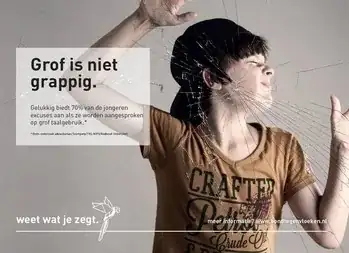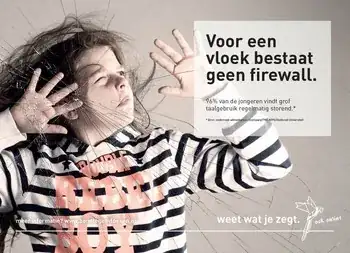The Dutch Bond Tegen Vloeken (Association Against Profanity) regularly advertises against the use of cursing, swearing, and profanity.
Their 2015/2016 campaign features 5 posters, each stating a claim, supposedly backed by research. I haven't been able to find the research mentioned, so I'm doubting the veracity of their claims.
The claims are (in Dutch, followed by the translation)
Een vloek raakt vooral anderen.
70% van de Nederlanders ervaart vloeken als hinderlijk.A curse mainly affects others.
70% of all Dutch are bothered by cursing.

En, opgelucht?
73% van de Nederlanders vindt schelden en vloeken door collega’s in functie niet kunnen.And, relieved?
73% of all Dutch think profanity and swearing by colleagues has no place at work.

Grof is niet grappig.
Gelukkig biedt 70% van de jongeren excuses aan als ze worden aangesproken op grof taalgebruik.Rude is not funny.
Fortunately, 70% of all young people apologize when they are held accountable for rude language.

Met vloeken breekt er iets.
Voor 61% van de Nederlanders is schelden met 'kanker' pijnlijk.Something breaks when cursing.
To 61% of all Dutch, cursing with 'cancer' hurts.‡

Voor een vloek bestaat geen firewall.
96% van de jongeren vindt grof taalgebruik regelmatig storend.There's no firewall for profanity.
96% of all young people are regularly bothered by rude language.

All these claims are sourced (according to the posters) to research done and surveys held by consulting agency Scompany, TNS-NIPO, and the Radboud University.
All sources I could find are either old (the latest profanity monitor (in Dutch) on the site of the Bond Tegen Vloeken is from 2008), or has been advice on how to communicate their message most effectively (by Scompany (in Dutch) and by a lecturer at the Radboud University).
The only relevant research done was a survey held by Scompany, among young people in Utrecht (a major Dutch city), which doesn't seem representative.
So are these claims and these numbers accurate?
‡: Cursing with diseases, both current ones like cancer and historical ones like the plague, is common in the Netherlands.
[btvnpc]: https://www.bondtegenvloeken.nl/nieuwepostercampagne/